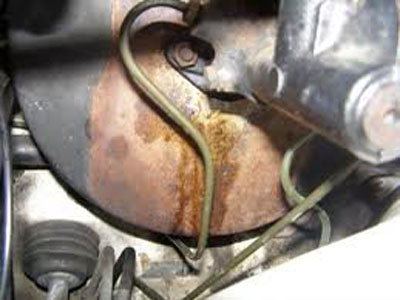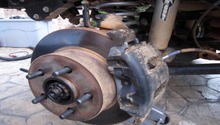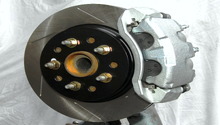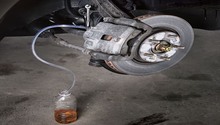Jeep Cherokee 1984-2001: Brakes Diagnostic Guide
Poor brake performance or noise coming from the brakes is more than just an inconvenience, it's a risk and a liability. Learn how to diagnose your brake system in your Jeep Cherokee here.
This article applies to the Jeep Cherokee XJ (1984-2001).
The braking system includes a number of components, which means a lot of things can go wrong, and especially as the car gets older, the braking system is prone to more and more malfunction. Continue reading and learn a number of quite easy diagnostics in case you are experiencing any issues that could be brake related. The problem could be on the brakes themselves behind the wheels, or it could be under the hood where the brake booster and master cylinder are located.

Materials Needed
- None
Step 1 – Check the brake booster
Do you find yourself pressing hard on the pedal?
The brake booster's job is to make the braking easier, which means you don't have to press the brake pedal as hard as you would without that extra help. If the brake booster is leaking, you could experience that you have to press the brake pedal a lot harder to slow your car down. Without the brake booster, the brake pedal feel changes completely, making it physically tough to stop the car. Sometimes, you can also hear the sound of air leaking out when the brake booster is leaking.
To diagnose a leaking brake booster, you could spray some soapy water on it with the engine on. (The brake booster is under the hood and it looks like what's circled in Figure 1.) If you see any bubbles from the soapy water, your brake booster is leaking and it has to be replaced.

If the brake booster looks good, proceed to Step 2.
Step 2 – Check master cylinder
Bad pedal feel could also be caused by the master cylinder.
The master cylinder is mounted on the brake booster under the hood. The master cylinder is where the brake pedal is connected to the brake system. The cylinder pushes the brake fluid out to the brake pistons at each wheel. The master cylinder has a couple of seals, and when the seals are starting to leak, the brake pedal is quite easy to press down. With enough leakage the brake pedal is easy to press all the way down to the floor.
When the master cylinder is leaking, it is possible to see some brake fluid leaking out on the outside of the master cylinder or on the brake booster. If the master cylinder is leaking, both the master cylinder and the brake booster have to be replaced. The reason for replacing the brake booster is that the leaking brake fluid might have leaked into the brake booster.

With the brake booster and the master cylinder looking good, go to Step 3.
Step 3 – Check brake pads
Your pads could be worn.
If you experience a squeaking sound or a metal-like grinding noise when braking moderately, you might have bad brake pads. Some report that cheaper aftermarket pads are particularly prone to making grinding noises. A squeaking sound from the brakes could be the result of the overheating of the brakes sometime earlier. Overheating could occur if the piston in a brake caliper is jammed.
To remedy the noise, the brake pads have to be replaced.

(Related Article: How to Jack up Your Car - CherokeeForum.com)
Related Discussions
- Brake Problem - CherokeeForum.com
- Problems with Brake Power - CherokeeForum.com
- Brake Problems - CherokeeForum.com
- Sound Like Air Leaks Out - CherokeeForum.com
- Metal Grinding When Braking - CherokeeForum.com






